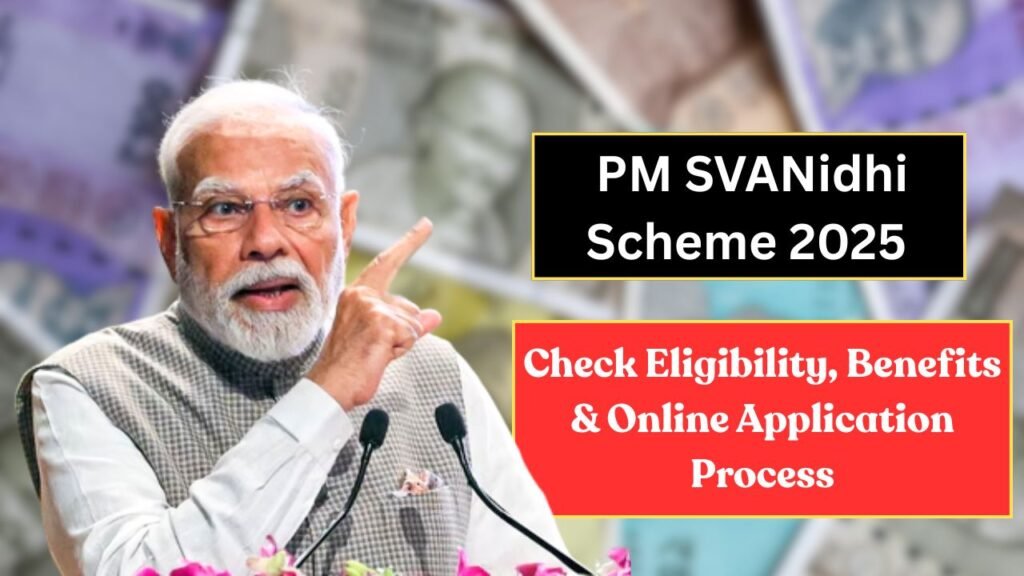The Modi Government is working hard to promote entrepreneurship among people in India. Many schemes have been launched to help small business owners start and grow their work. One such important scheme is the PM SVANidhi Scheme, started to support street vendors with financial help and easy loans.
What is PM SVANidhi Scheme
The PM Street Vendor’s Atmanirbhar Nidhi, also known as PM SVANidhi, was launched on June 1, 2020, during the COVID-19 pandemic. It was started by the Ministry of Housing and Urban Affairs. The goal of the scheme is to help street vendors get small loans at low-interest rates so they can restart their work after the pandemic.
Financial Help for Street Vendors
Under this scheme, street vendors can get working capital loans without giving any security or guarantee. The loan amount can be up to Rs 15,000, Rs 25,000, or Rs 50,000 depending on the stage of repayment and performance.
Here is a simple look at the loan details:
| Loan Stage | Loan Amount | Interest Subsidy | Cashback Benefit |
| First Loan | Up to Rs 15,000 | 7% per year | Up to Rs 1,600/year |
| Second Loan | Up to Rs 25,000 | 7% per year | Up to Rs 1,600/year |
| Third Loan | Up to Rs 50,000 | 7% per year | Up to Rs 1,600/year |
Street vendors who repay their loans on time get a 7% interest subsidy per year. They also earn cashback up to Rs 1,600 every year if they use digital payments regularly. There are no charges for closing the loan early, which gives more freedom to the vendors.
Who Can Apply for PM SVANidhi
Street vendors who have a Certificate of Vending or Identity Card from Urban Local Bodies (ULBs) can apply for the loan. Vendors who were part of the local body survey but have not yet received their certificate can get a Provisional Certificate of Vending online.
Vendors who started their business after the survey can also apply if they have a Letter of Recommendation (LoR) from the Urban Local Body (ULB) or Town Vending Committee (TVC). Even vendors from nearby rural or semi-urban areas can apply if they sell goods within the ULB limits and have an LoR.
How to Apply for PM SVANidhi Loan
Applying for the PM SVANidhi loan is very simple. Vendors can apply directly through the official PM SVANidhi portal or visit the Common Service Centre (CSC) near their area.
The loan is given through many financial institutions like:
- Scheduled Commercial Banks
- Regional Rural Banks
- Small Finance Banks
- Cooperative Banks
- NBFCs and Microfinance Institutions
- Self-Help Group (SHG) Banks
The Small Industries Development Bank of India (SIDBI) is the main implementation partner for this scheme.
Documents Required
To apply, street vendors need to complete simple KYC formalities. The required documents include:
- Aadhaar Card
- Voter ID Card
Other optional documents like PAN Card, MGNREGA Card, or Driving License can also be used. These help verify identity and make the process faster.
Benefits of PM SVANidhi
This scheme has changed the lives of many small street vendors in India. It gives them confidence to continue their business and become self-reliant. The easy loan process, no collateral requirement, and digital payment rewards make it one of the most successful government schemes.
It also encourages vendors to use online payment methods, helping them enter the digital economy. With timely repayment, vendors can get larger loans in the next stage, helping them expand their work easily.
Conclusion
The PM SVANidhi Scheme is a big step by the Modi Government to support small vendors and promote self-employment. It gives financial help and digital benefits, making it easier for vendors to grow their business. By offering loans without security and supporting digital transactions, this scheme truly helps India’s street vendors become self-reliant and confident in their work.
Disclaimer:This article is for information purposes only. Please visit the official PM SVANidhi website or contact your nearest Common Service Centre (CSC) for accurate and latest details about eligibility, loan terms, and application process. The government may update scheme rules from time to time.




